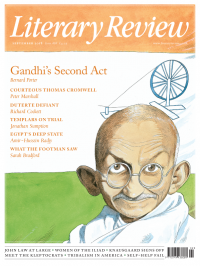Alan Ryan
Age of Anxiety
The Monarchy of Fear: A Philosopher Looks at Our Political Crisis
By Martha C Nussbaum
Oxford University Press 249pp £18.99
Nervous States: How Feeling Took Over the World
By William Davies
Jonathan Cape 252pp £16.99
Both of these books are directed to the strange political times in which we live. The Monarchy of Fear, indeed, is subtitled ‘A Philosopher Looks at Our Political Crisis’. They could hardly be more different, however. Martha Nussbaum’s book is highly personal in all sorts of ways: it begins with a substantial autobiographical preface in which she recounts her early life and its impact on her subsequent career as one of the world’s best-known and best-regarded moral philosophers; every chapter harks back to the work she has previously done on emotions in social and political life. Readers who have read Nussbaum’s Political Emotions in particular may feel that The Monarchy of Fear is somewhat repetitive, but new readers get what amounts to a vivid introduction to a lot of her recent work.
William Davies, on the other hand, dives straight into his topic: the capacity of feelings to overcome reason. His chosen example is the extraordinary occasion in November 2017 when panic-stricken passengers and passers-by at Oxford Circus station became convinced that a terrorist attack was taking place and that shots had been fired. It soon emerged that no shots had been fired and that there was no attack of any sort. Passengers on the platform had been disturbed by a scuffle between two men, and their movement away from the scuffle had disconcerted other passengers, having a sort of amplifier effect.
Davies is interested in what one might call the rise and fall of attempts to make society reasonable. After a brief but enlightening account of the life of Gustave Le Bon and his work on the irrationality of crowds, he turns back to the 17th century and rationalists

Sign Up to our newsletter
Receive free articles, highlights from the archive, news, details of prizes, and much more.@Lit_Review
Follow Literary Review on Twitter
Twitter Feed
How to ruin a film - a short guide by @TWHodgkinson:
Thomas W Hodgkinson - There Was No Sorcerer
Thomas W Hodgkinson: There Was No Sorcerer - Box Office Poison: Hollywood’s Story in a Century of Flops by Tim Robey
literaryreview.co.uk
How to ruin a film - a short guide by @TWHodgkinson:
Thomas W Hodgkinson - There Was No Sorcerer
Thomas W Hodgkinson: There Was No Sorcerer - Box Office Poison: Hollywood’s Story in a Century of Flops by Tim Robey
literaryreview.co.uk
Give the gift that lasts all year with a subscription to Literary Review. Save up to 35% on the cover price when you visit us at https://literaryreview.co.uk/subscribe and enter the code 'XMAS24'